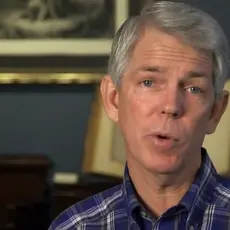David Barton's insistence that various social institutions and governmental provisions have come verbatim out of the Bible has reached its logical culmination with the release of a new audio presentation entitled "God in the Constitution" in which Barton seeks to lay out the seven specific ways in which Constitution is "explicitly Christian [in] nature."
The hour-long program consisted primarily of various familiar claims Barton has made over the years, merely consolidated into one presentation. But Barton did add a few new wrinkles, like his assertion that every one of the amendments in the Bill of Rights was rooted in the Bible, including the Sixth Amendment's provision guaranteeing the accused the right to confront their witnesses, which Barton claimed was rooted in the passage about of Jesus and the woman accused of adultery:
Now how can you say Due Process protections come out of the Bible? Due Process is the right to a trial by jury, the right to compel witnesses on your behalf, the right to confront your accuser, all these different things that we have in the 4th-8th Amendment. How in the world can that come out of the Bible? Well, the answer is real simple ... You have trials throughout the Bible. Peter was in several trials, Paul was in several trials, Jesus was in trials. Jesus was actually supposed to be judge over a trial - they brought to him the woman caught in adultery and He looked around and said "woman, where are your accusers?" In other words, what are you doing here and your accusers aren't here to make the accusation, you can't do hearsay charges.
Of course, just as he does with Matthew 20's Parable of the Workers in the Vineyard, Barton totally misrepresents the context and message of this passage, which appears in John 8: 2-11:
And early in the morning He came again into the temple, and all the people came unto Him; and He sat down and taught them.
And the scribes and Pharisees brought unto Him a woman taken in adultery. And when they had set her in the midst, they said unto Him, “Master, this woman was taken in adultery, in the very act. Now Moses in the law commanded us that such should be stoned but what sayest thou?”
This they said testing Him, that they might have cause to accuse Him. But Jesus stooped down and with His finger wrote on the ground, as though He heard them not.
So when they continued asking Him, He lifted Himself up and said unto them, “He that is without sin among you, let him first cast a stone at her.”
And again He stooped down and wrote on the ground.
And they who heard it, being convicted by their own conscience, went out one by one, beginning with the eldest even unto the last, and Jesus was left alone with the woman standing in the midst.
When Jesus had lifted Himself up and saw none but the woman, He said unto her, “Woman, where are those thine accusers? Hath no man condemned thee?”
She said, “No man, Lord.” And Jesus said unto her, “Neither do I condemn thee; go, and sin no more.”
First of all, the woman was not brought to Jesus for trial, but rather as a test to try and entrap Him. And secondly, the reason there were no accusers left to condemn the woman was because they had all dispersed after Jesus delivered his famous "let he who is without sin cast the first stone" statement.
The lesson of this passage is that all people are guilty of sin and in need of repentance and forgiveness ... but Barton presents it as proof that our Constitution is based specifically on the Bible.





